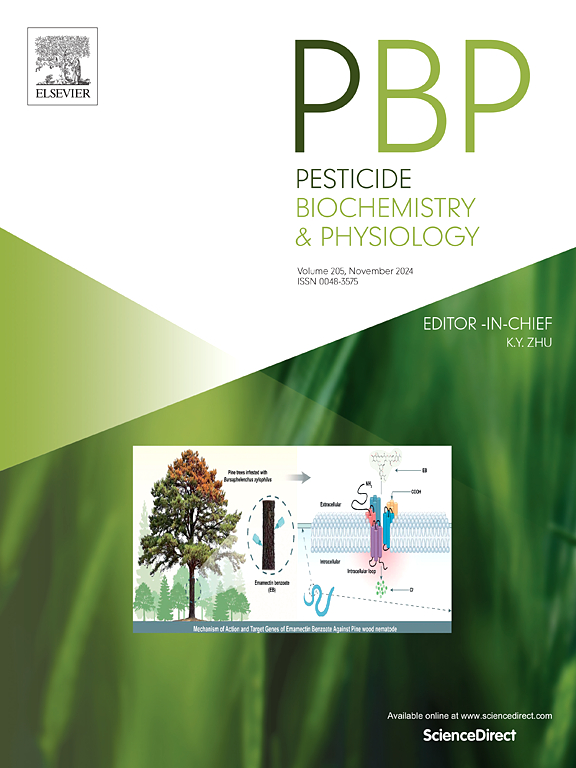β-氧化叶绿素抑制增殖镰刀菌组蛋白的赖氨酸乙酰化,从而阻碍核糖体的生物合成和功能
IF 4.2
1区 农林科学
Q2 BIOCHEMISTRY & MOLECULAR BIOLOGY
引用次数: 0
摘要
天然双环倍半萜--β-氧化叶黄素(BCPO)对镰刀菌具有抑制活性。虽然以往的研究通过各种生化机制证明了 BCPO 的抗真菌特性,但 BCPO 通过组蛋白去乙酰化酶(HDAC)调节 DNA 表观遗传修饰的作用却较少受到关注。本研究旨在阐明 BCPO 如何通过影响组蛋白乙酰化来抑制增殖镰刀菌。我们的研究结果表明,BCPO能将FPRO_01165(FpSIR2)的酶活性提高到6.01纳克/分钟/毫克,增幅达55.30%。分子对接分析和分子动力学模拟证实了 BCPO 与 FpSIR2 之间的相互作用。此外,高浓度(HC)BCPO能显著抑制F. proliferatum的生长,导致H3K9ac和H3K27ac修饰水平明显降低。我们进行了染色质免疫沉淀测序(ChIP-seq)以确定 H3K9ac 和 H3K27ac 的富集,同时还获得了 HC 处理组的转录组数据。综合分析表明,H3K9ac 和 H3K27ac 水平的降低主要影响了增殖蛙的核糖体通路,导致几个核糖体基因及其相应蛋白(如 RPL4、RPS19 和 RPS16)的下调。我们的研究结果表明,BCPO 可刺激 FpSIR2 的产生和活性,进而抑制 F. proliferatum 中组蛋白赖氨酸乙酰化。这种抑制作用会抑制核糖体的生物合成和功能,并抑制该病原体的整体生长。BCPO 减少乙酰化的特性为开发高效低毒的抗真菌剂提供了新的思路。本文章由计算机程序翻译,如有差异,请以英文原文为准。

β-Caryophyllene oxide inhibits lysine acetylation of histones in Fusarium proliferatum to block ribosomal biosynthesis and function
The natural bicyclic sesquiterpene, β-Caryophyllene oxide (BCPO), has demonstrated inhibitory activity against Fusarium species. While previous studies have documented its antifungal properties through various biochemical mechanisms, the role of BCPO in modulating epigenetic modifications of DNA via histone deacetylases (HDACs) has received comparatively less attention. The study aims to elucidate how BCPO inhibits Fusarium proliferatum by affecting histone acetylation. Our results indicate that BCPO enhances FPRO_01165 (FpSIR2) enzyme activity to 6.01 ng/min/mg, representing a 55.30 % increase. Molecular docking analysis and molecular dynamics simulation confirmed the interaction between BCPO and FpSIR2. Furthermore, high concentrations (HC) of BCPO significantly inhibited the growth of F. proliferatum, resulting in marked reductions in H3K9ac and H3K27ac modification levels. We conducted chromatin immunoprecipitation sequencing (ChIP-seq) to identify enrichments of H3K9ac and H3K27ac, while also obtaining transcriptomic data from the HC treatment group. Combined analyses revealed that decreased levels of H3K9ac and H3K27ac primarily affected ribosomal pathways in F. proliferatum, leading to downregulation of several ribosomal genes and their corresponding proteins, such as RPL4, RPS19, and RPS16. Our findings suggest that BCPO stimulates both the production and activity of FpSIR2, which subsequently inhibits histone lysine acetylation in F. proliferatum. This inhibition suppresses ribosome biosynthesis and function as well as overall growth in this pathogen. The property of BCPO to reduce acetylation provides new insights for developing highly efficient yet low-toxicity antifungal agents.
求助全文
通过发布文献求助,成功后即可免费获取论文全文。
去求助
来源期刊
CiteScore
7.00
自引率
8.50%
发文量
238
审稿时长
4.2 months
期刊介绍:
Pesticide Biochemistry and Physiology publishes original scientific articles pertaining to the mode of action of plant protection agents such as insecticides, fungicides, herbicides, and similar compounds, including nonlethal pest control agents, biosynthesis of pheromones, hormones, and plant resistance agents. Manuscripts may include a biochemical, physiological, or molecular study for an understanding of comparative toxicology or selective toxicity of both target and nontarget organisms. Particular interest will be given to studies on the molecular biology of pest control, toxicology, and pesticide resistance.
Research Areas Emphasized Include the Biochemistry and Physiology of:
• Comparative toxicity
• Mode of action
• Pathophysiology
• Plant growth regulators
• Resistance
• Other effects of pesticides on both parasites and hosts.

 求助内容:
求助内容: 应助结果提醒方式:
应助结果提醒方式:


